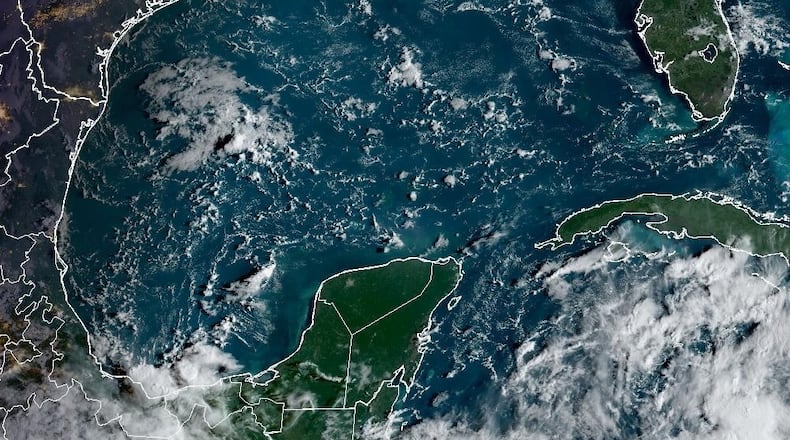For the latest updates on Hurricane Helene, follow AJC’s live coverage and hour-by-hour forecasts.
A cluster of thunderstorms in the Caribbean could intensify rapidly into a major hurricane over the Gulf of Mexico this week, forecasters said Monday, potentially bringing heavy rain and damaging winds into Georgia as soon as Thursday.
The tropical storm hasn’t developed yet, but if it forms as expected, it would be the eighth-named storm of the Atlantic hurricane season and take the name Helene.
An advisory issued by the National Hurricane Center at 5 p.m. Monday projects the system, labeled “Potential Tropical Cyclone Nine,” could reach hurricane strength (sustained winds of 74 mph or greater) over the northwest Caribbean Sea as soon as Tuesday night. The forecast predicts the storm will lash Mexico and western Cuba, where tropical storm warnings and hurricane watches are in effect, before moving from the Caribbean into the Gulf of Mexico.
There’s uncertainty about what the system will do once it gets over the Gulf, but ocean heat is the primary fuel source for hurricanes and the sea surface temperatures are near-record hot for this time of year. That means the storm should have access to plenty of energy to undergo rapid intensification, defined as an increase in wind speed of about 35 mph in just a day.
As the planet warms because of human-caused climate change, research has shown more hurricanes are rapidly intensifying.
“The Gulf right now has temperatures that are basically at record-highs, so it’s warmer than it usually is, even for this time of year,” said Pam Knox, an agricultural climatologist at the University of Georgia.
The NHC’s 5 p.m. Monday forecast shows the storm growing into a major hurricane — Category 3 or greater, with winds of at least 111 mph — before it reaches the U.S.’s Gulf Coast. The storm’s path should come into focus over the next 48 hours, but for now, the most likely paths show it making landfall in the Florida Panhandle or a bit east, in the state’s Big Bend region.
After it comes ashore, the hurricane is expected to bring dangerous winds and heavy rain into Georgia. The storm’s track will determine which areas are most impacted, but it’s possible metro Atlanta could see damaging winds and rain capable of downing trees and causing power outages as soon as Thursday.
The NHC’s 5 p.m. Monday update places almost the entire state of Georgia within its “warning cone,” which shows the most likely path of the storm.
If the forecast proves accurate, it could be bad news for Georgia farmers, who have been stung by several tropical storms in recent years. September is the thick of the harvest season for Georgia cotton growers, and pecans will be harvested, too, over the next few months. Both rank among the state’s most valuable agricultural products.
Knox said the uncertainty around the storm means Georgians from Atlanta to Savannah and everywhere in between should begin preparing now. “It’s important for people to keep in mind that it could hit anywhere in Georgia and to not let their guard down,” Knox said.
For football fans, it’s also unclear whether the storm will impact Saturday night’s hotly anticipated clash between No. 2 Georgia and No. 4 Alabama in Tuscaloosa, Alabama. But unless the storm stalls, Knox said it appears the worst conditions will have moved out of the vicinity of Bryant-Denny Stadium before the scheduled 7:30 p.m. kickoff.
A note of disclosure
This coverage is supported by a partnership with Green South Foundation and Journalism Funding Partners. You can learn more and support our climate reporting by donating at ajc.com/donate/climate.
About the Author
Keep Reading
The Latest
Featured


